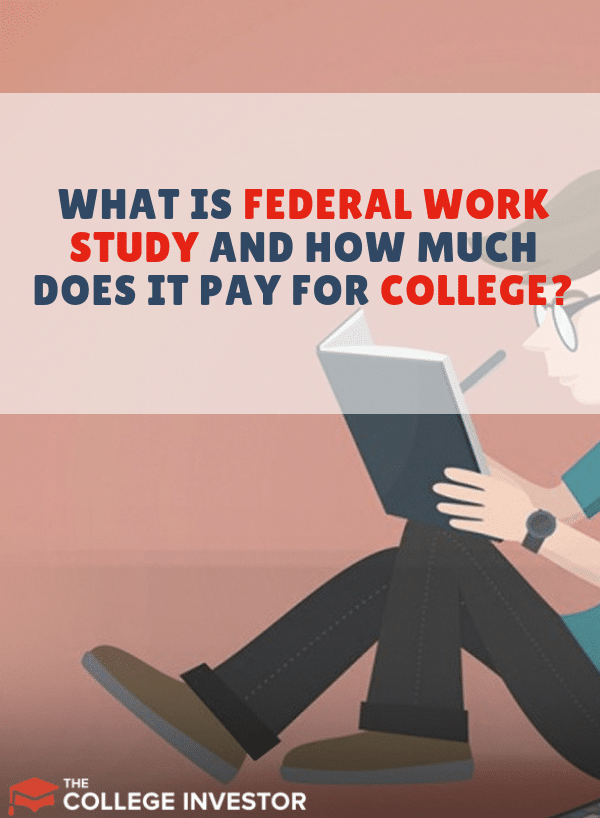
Working part-time during your college career is a great way to cover your living expenses, avoid some amount of student loan debt, and gain skills as an undergraduate.
One way to keep a part-time job during your undergraduate, graduate, or professional school career is through the Federal Work-Study program. The Federal Work-Study program provides part-time jobs to students demonstrating financial need.
The income from Federal Work-Study jobs is taxable, but is exempt from Social Security taxes (known as FICA). Here’s what you need to know about the Federal Work-Study program.
What Is the Work-Study Program?
The Federal Work-Study program is a form of Federal financial aid for college in the United States. Under the work-study program, eligible students can earn income in “work-study”-specific jobs.
The amount of “work-study” aid you’re eligible for will be listed in your financial aid award letter. There’s no minimum or maximum amount of “work-study” that you’ll see in your financial aid letter.
The exact amount will depend on your school’s work-study program. Usually, the eligible amount is anywhere from $2,000 to $5,000 per year.
However, you’re not guaranteed to get the full amount of money listed in the award letter. Instead, you must earn the money through part-time work.
Most work-study jobs tend to be on-campus positions like working at the library circulation desk, doing custodial services, or working in a food service position. However, depending on your school’s program, work-study could include any number of part-time jobs including roles with public service organizations, or working in organizations related to your field of study.
The money from a work-study job generally “feels” more like money from any other job. Usually, the school or your employer will send you a check every two weeks (or once a month) based on the number of hours you worked. Cover an extra shift? You’ll see a bigger paycheck.
Who Is Eligible for a Work-Study Job?
To be eligible for a work-study job, you must fill out the Free Application for Federal Student Aid (FAFSA). After you complete the application, you’ll receive a letter explaining the types of aid you’re eligible for. In many cases, students with financial need will see a line item for “work-study.”
But having a work-study award doesn’t guarantee that you’ll get a work-study job. You must apply for a work-study job and actually do the work associated with it.
Plus, you need to typically apply for the FAFSA early to be eligible. Make sure you're on top of your state's FAFSA deadlines and apply early!
There is always a handful of highly coveted work-study positions where you’re essentially paid to do your schoolwork or surf the internet. However, that type of job isn’t easy to come by in the work-study world. For the most part, the jobs are hard work.
How Much Does a Work-Study Job Pay?
The amount you earn from a work-study job tends to be on par with what anyone would earn for similar work. Depending on where you live in the country, the job could pay as little as $7.25 per hour (the current Federal minimum wage) to $15 per hour or more in tight labor markets.
For a lower-stress, part-time job, work-study pay tends to be decent. However, it won’t make you rich. And, you won’t see big raises from being a high performer.
Because the hourly rates from work-study jobs clock in at “fine,” I encourage college students to consider whether they can supplement their work-study income by applying for scholarships or finding higher-paying work such as performing music in an ensemble, offering private lessons, car-detailing, or reffing sports. Even sporadic income from these sources can make the difference between putting car insurance payments on a credit card and staying solvent in college.
Is Income from My Work-Study Job Taxable?
Income from work-study jobs is taxable. However, you will avoid the 7.3% FICA taxes which are normally removed for Social Security and Medicare coverage.
If you’re a relatively low earner, you should expect to see most of your income in your work-study paycheck. Enjoy that full paycheck now, because in a few years, you’ll hopefully be paying lots of taxes (thanks to your high earnings rate).
Should I Take a Work-Study Job or Try a Different Part-Time Job?
If you’re eligible for work-study, I would urge you to find the best work-study job that you can. Use “best” to mean whatever you want it to mean. In college, I took a lower-paying job that allowed me to complete homework during my office hours. This meant I had plenty of time for cross-country and track, and even an occasional side hustle.
I had a friend who worked at a local Boys & Girls Clubs of America location which led directly to an internship and a continued career in the non-profit sector.
Most of the time, income from work-study jobs is fairly steady. You can expect to work about the same number of hours week in and week out. In general, most college students should easily handle their studies and a work-study job.
The downside of work-study jobs is the cap on earnings. If you’re motivated to earn money, you are likely to find better opportunities outside of the work-study program.
Often, “middle-skill” jobs such as working in a call center, waiting tables, working as a licensed practical nurse (LPN) or emergency medic, tutoring, or tending a bar pay more than entry-level jobs. Particularly motivated students may earn even more by freelancing or starting a business.
For students without reliable transportation, an on-campus work-study job can provide a stable income without raising costs. However, if you’ve got a car, or you live in a city with solid public transit or safe biking options, a higher earning option may be better for you.
Bottom Line
Work-study jobs are a great way to earn money while attending school. But they aren’t your only option. If you’re eligible for work-study, take advantage of the opportunity to work, but keep your eyes out for earning opportunities that will allow you to earn more, learn more, or develop better skills.

Hannah is a wife, mom, and described personal finance geek. She excels with spreadsheets (and puns)! She regularly explores in-depth financial topics and enjoys looking at the latest tools and trends with money.
Editor: Clint Proctor Reviewed by: Chris Muller
